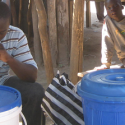Sketch for a research & training facility, starter culture production, and market research

In 2015, the University of Zambia, together with five partner organizations, started a project on Zambian traditional non-alcoholic fermented foods. Mabisi (based on milk) and Munkoyo (based on cereal) were chosen for the study. These products are formed through the activity of fermenting microbes that convert raw materials into products with higher value. The aims of the study are to formalise current artisanal processing practice based on a best practice of current local house hold level processing and to design starter cultures of defined mixtures of bacteria to optimize and standardize the fermentation process.
Local farmer cooperatives as focal groups as owners of the tradition. Local farmers and their cooperatives and organisations are involved in our project as key stakeholders. They have been instrumental in designing the research questions and in providing information and samples through our surveys and ongoing consultation. Since ancient times, local people have produced their milk and cereal based traditional foods mainly for self-consumption and for small-scale sales in local communities using part of their primary production, selling most of the raw milk to larger companies. In a recent development, local farmer cooperatives have started to collectively process their primary produce, such as raw milk, into processed products.
Our research on Mabisi and Munkoyo is underway, results thus far point to feasibility for development of local starter culture. Our research so far has revealed that for both Mabisi and Munkoyo variations exist in local processing that give rise to distinct types of Mabisi and of Munkoyo. We are currently formalising the household level processing procedures that yield the best products. The identification of what microbial cultures are essential to include in a starter culture are underway. Results show that, such a starter culture will most likely consist of around six species, in contrast to Western fermented products that commonly consist of one or two species. In addition, we can already conclude that production of traditional fermented products could be performed by local farmer cooperatives.
In order to implement production of traditional fermented products, our research findings need to be translated into (1) marketing plans and (2) concrete protocols for the upscaling of household production to SME level processing aimed at local cooperatives including starter culture production.
Please download the complete Sketch (PDF) for a research and training facility, starter culture production, and market research at University of Zambia, School of Agricultural Sciences, Department of Food Science and Nutrition.






